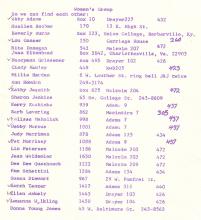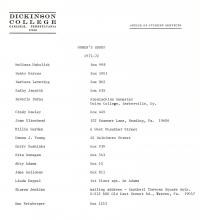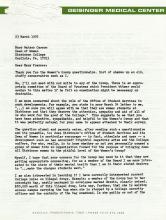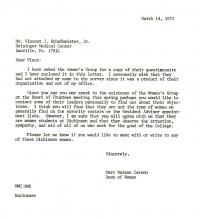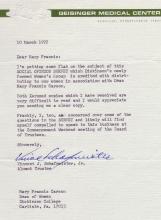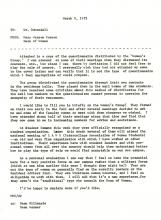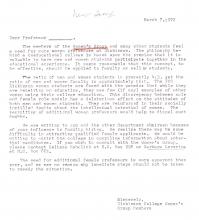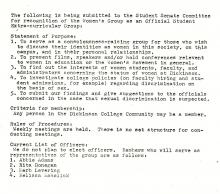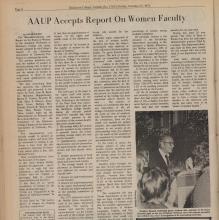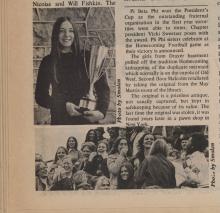Women's Group Members 1971-72
The Office of Student Services published a list of members of the Women's Group for the 1971-72 Academic Year. These women included: Melissa Maholick, Debby Marcus, Barbara Levering, Kathy Jaquith, Beverly Burns, Cindy Hawley, Joan Eltonhead, Millie Harden, Donna J. Young, Kerry Kushinka, Rita Donegan, Abby Adams, Jane Holloway, Linda Keppel, Sharon Jenkins, and Ann Reinberger. It also listed the contact information for these women.
More interested in the state of their mental health
In his response to Dean of Women Mary Watson Carson, Alumni Trustee Vincent Schafmeister says of the Social Opinion Survey of the Women's Group, "sort of shakes up an old, stuffy conservative such as I." He declines the dean's offer to put him into contact with members of the group in order to determine their objectives, saying he is more interested in the role of the Office of Student Services in encouraging this organization. He references the "frightful negatives" and the suffering of the college as consequences of this kind of encouragement.
Social Opinion Survey FLAK
Alumni Trustee Vincent J. Schafmeister, Jr. wrote to Dean of Women Mary Francis Carson requesting a clearer copy of the Social Opinion Survey distributed by the Women's Group. Schafmeister expresses his concern over some of the questions in the survey, claiming that he would be "compelled to speak to this business at the Commencement Weekend meeting of the Board of Trustees."
Not the type of women we generally find
Dean of Women Mary Watson Carson sends a memo to Dr. Rubendall regarding the "Social Opinion Survey" of the Women's Group. She explains that she did not give permission for them to attach her name to the survey. According to the dean, the Women's Group distributed the questionnaire in residence halls and mail boxes. Dean Carson reports that the group formed early in the fall and invited some faculty women to meet with them. The same week that Carson wrote this letter, Student Senate officially recognized the group as an organization.
Women's Group Calls for More Female Professors
The members of the Women's Group composed a letter to professors calling for more female faculty at Dickinson College. The Women's Group writes that the foundation of coeducation presupposes that it is valuable to have both men and women students participate in the educational experience. They explain that this concept should be applied to faculty as well and cite the ratio of male to female faculty of 10:1. The male to female student ratio, by contrast, was 4:3.
Women's Group Seeks Official Recognition in the 1970s
The Women's Group submitted a statement of purpose, criteria for memberships, rules, and list of officers to the Student Senate Committee in order to receive recognition as an official group on campus. Their purpose statement explained that they wanted to serve as a consciousness-raising group; to present films, speakers, and hold conferences that dealt with women in education or the Women's Movement; and to investigate potential discrimination at Dickinson. Any member of the Dickinson College Community could become a member, and the Women's Group would hold weekly meetings.
AAUP Accepts Report on Women Faculty
In October of 1972 the American Association of University Professors unanimously adopted the "Recommendations and Report on the Status of Women in the Academic Profession" at Dickinson College. The primary questions concerned the number of women in decision-making roles to serve as models for the women students and the salaries of women in comparison to those of men with equal qualifications and responsibilities.
Pi Beta Phi Wins the President's Cup
Pi Beta Phi won the President's Cup as the outstanding fraternal organization in the first year sororities were able to enter. Their victory was announced during the Homecoming Football Game in October of 1972. At the same time, the women from Drayer basement pulled off the traditional Homecoming prank and kidnapping of the duplicate mermaid which was located on the cupola of Old West. Second floor of Malcolm Hall retaliated by taking the original from the May Morris room of the library.

